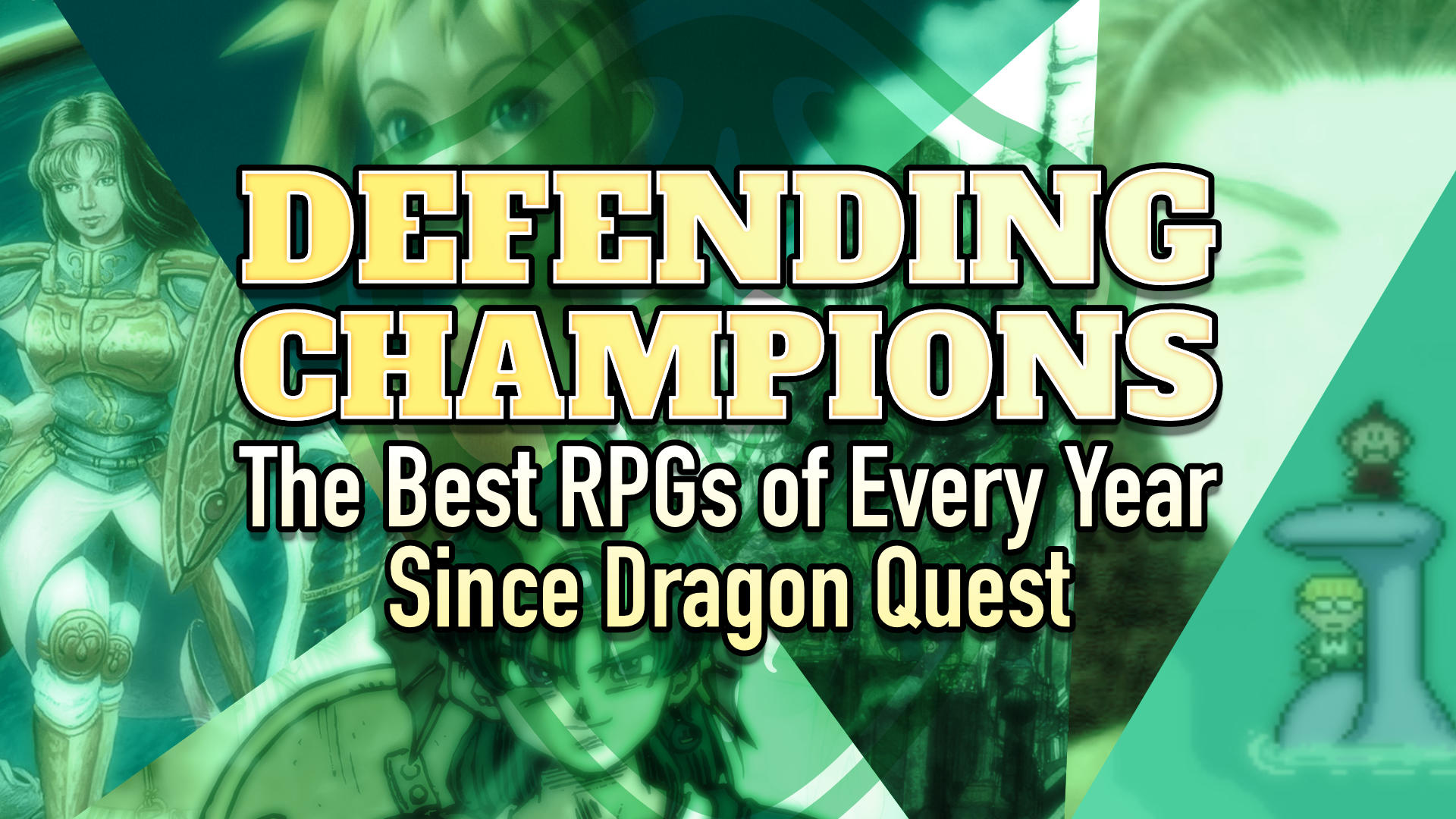Dragon Quest was first released in 1986 in Japan. Although it never took off in the United States and wasn’t the first RPG ever released, there’s no question that DQ helped define what JRPGs are today.
So in honor of Dragon Quest, we decided to look back at our favorite RPGs of each year since 1986. After more than a few conversations about what “really” deserved to be on the list, our staff voted for their favorite games from each year.
This list has some surprising changes from many of our previous ones, in part because we went with Japanese release dates in honor of Dragon Quest‘s tradition. We also have new staff members with different tastes and preferences. But doesn’t that make it more fun?
Along with our staff choices, we’re also presenting your choices! We had a great turn out, and you’ll notice some interesting differences between our choices and yours.
We’ll be releasing the rest of the decades over the coming days, so be sure to check back as we do!
What are your favorite RPGs of each year following Dragon Quest‘s release? Let us know on Facebook, Instagram, Twitter, and Discord!
1987
Winner: Final Fantasy
by Jonathan Logan
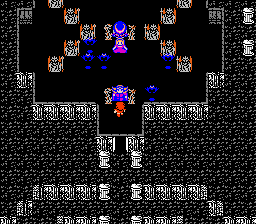
When Hironobu Sakaguchi called his latest game Final Fantasy, he meant it. Square was on the verge of bankruptcy, so it could have been the very last title the company would publish. Now that we are anticipating a sixteenth fantasy in the long-running and beloved series, it’s incredible to think about just how far the original pushed the RPG genre.
Players can choose their own character classes, building a party to suit their preferences. The art style and music are stunning, featuring designs by the legendary Yoshitaka Amano and music from Nobuo Uematsu. And while the storyline could be considered basic by modern standards, it includes many conventions that the Final Fantasy series still uses today, such as the crystals, Warriors of Light, and airships. While the original is undoubtedly still playable, I personally prefer the Game Boy Advance remake that offers upgraded graphics, mechanics, and music. Either way, you can’t go wrong with this remarkable piece of gaming and RPG history!
Runner-Up: Phantasy Star
by Nilson Carroll
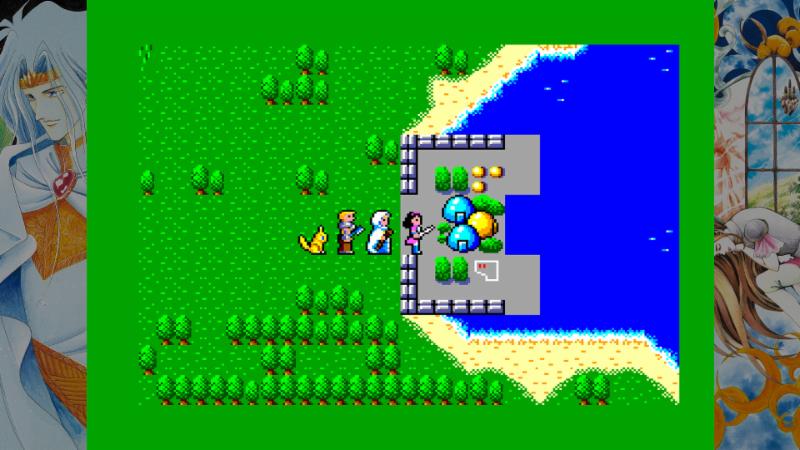
Enix’s Dragon Quest may have codified the genre, but it was Sega’s Phantasy Star a year later that took the console JRPG to a truly far-out place. Players follow the rebel leader Alis, a capable and intelligent female protagonist/icon, in a futuristic, Star Wars-inspired fantasy adventure. Decisions from the production staff delightfully queer the genre, from Rieko Kodama’s androgynous character designs to a complete lack of damsel in distress syndrome. Phantasy Star forgoes medieval medallion/orb collecting, instead offering a sober, political anti-fascist narrative.
Readers’ Choice
- Winner: Final Fantasy (53%)
- Runner-Up: Dragon Quest II (16%)
1988
Winner: Dragon Quest III (Dragon Warrior III)
by Bob Richardson
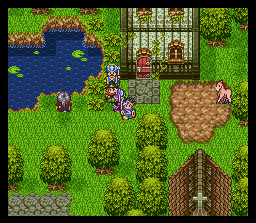
Dragon Quest III is probably where the series truly hit its stride. After all, its Japanese release essentially forced Enix to release Dragon Quest games on Saturdays only since kids would literally skip school to buy them due to shortages. This beloved franchise may not hold the same fame or high regard outside of Japan, but it’s without a doubt the quintessential RPG. With the series as a whole, fans know what to expect, and that’s exactly why they keep clamoring for more. The Zen-like quality to combat and breezy story matched by charming character and enemy design create a dreamy world that’s somehow littered with monsters and tranquil scenery at the same time.
Specifically regarding DQIII, players create a team of three combatants of their choosing led by a hero. The day-night cycle was introduced in this entry, and players got to explore a world that felt more lifelike than ever before in console gaming. Dragon Quest III‘s world design was so well done that every time players left town and ventured off into the wild, they had no idea what they were going to find. It even held an incredible secret halfway through the game…
Runner-Up: Ultima V: Warriors of Destiny
by Hilary Andreff
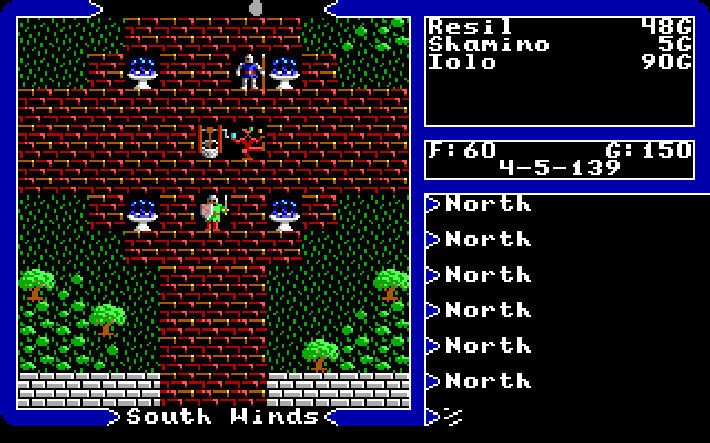
It’s great to see some representation for the Ultima series in this list, though people unfamiliar with late 80s/early 90s PC games may be asking, “What’s an Avatar?” And that’s the really fascinating thing about Ultima V. The previous game has the player following the Eight Virtues (seriously, you even lose credibility if you attack fleeing enemies) in order to claim the title of Avatar and lead Britannia, but Ultima V? Ultima V asks the real questions.
Lord British is missing and the Virtues are turned on their heads. Lord Blackthorn, the interim ruler, has established oppressive rules based on those very Virtues that average citizens help him enforce under the corrupting influence of the Shadow Lords. How do you Avatar (read: make things right) under these circumstances? What does it mean to be a hero when someone uses what you established to hurt others? At the time, most other RPGs were very straightforward in their morality. This alone earns Ultima V a place here, but it also hooks you with challenging gameplay and an intriguing world. Just watch out when the Shadow Lords come to town and everyone loses it, though.
Readers’ Choice
- Winner: Dragon Quest III (57%)
- Runner-Up: Final Fantasy II (22%)
1989
Winner: Phantasy Star II
by Nilson Carroll
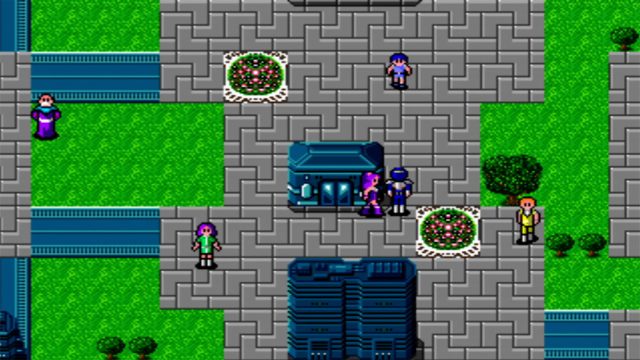
Sega’s take on the JRPG was always slightly edgier, more futuristic, and more anime than that of Square, Enix, and Falcom. With the added power of the Mega Drive at their disposal, the production team made one of the largest, and grimmest, JRPGs of the early 16-bit era with Phantasy Star II. Taking place “1000 years” after the first game, Phantasy Star II sees government worker Rolf stumble upon an ancient corruption threatening his home planet. Although the first-person 3D dungeons of its predecessor are gone, PSII’s lengthy, maze-like dungeons are totally hardcore, unnecessarily complicated, and difficult. But this only adds to the drama of the quest, making it feel larger and far more dangerous. Accompanying the colorful graphics is Tokuhiko Uwabo’s soundtrack: a pulsing, often upbeat but also melancholic 1980s thrill ride. Everything here is so stylish and has a truly unique identity.
Predating the US release of Final Fantasy, Phantasy Star II helped solidify a base of JRPG fans in the West with its epic scale and serious, human themes. Today, it’s harder to recommend, if only because it has the most “old school difficulty” out of any of the big retro JRPGs, but it’s still something of an early genre masterpiece.
Runner-Up: Mother (EarthBound Beginnings)
by Kiyan Mullen
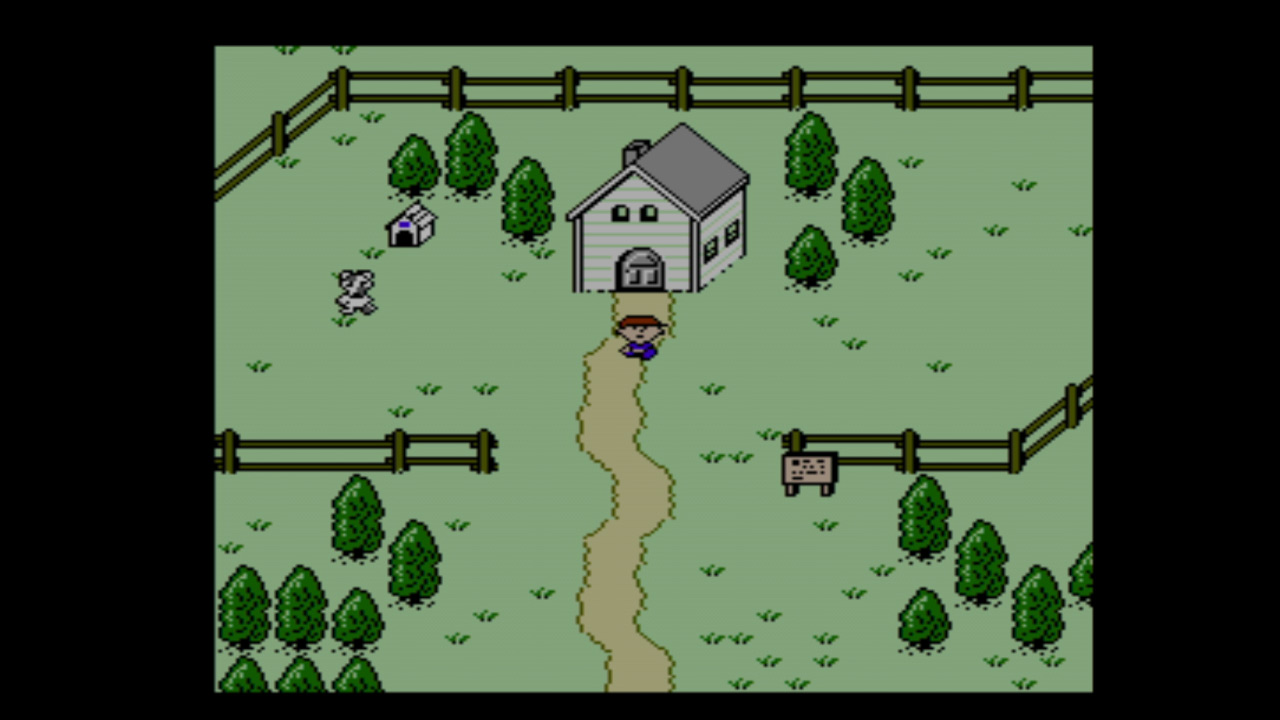
Mother’s not the prettiest RPG on the NES. It’s not the most polished. And it’s often overshadowed by its sequels. But as far as I’m concerned, Nintendo/Ape/Shigesato Itoi hit the mother lode with this one.
Why? Heart. Beneath its quirky, acerbic surface, Mother hides its cornerstone: a real, beating heart that pumps corpuscular compassion to every inch of the game’s 8-bit being.
With a surprising amount of replayability (a lot of sequence-breaking shenanigans are possible here) and all the zaniness the series is known for, Mother offers a great time to anyone willing to welcome the grind with an open mind.
Readers’ Choice
- Winner: Mother (41%)
- Runner-Up: Phantasy Star II (36%)
1990
Winner: Dragon Quest IV
by Michael Sollosi
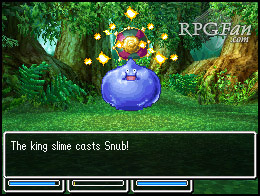
Dragon Quest IV (the artist formerly known as Dragon Warrior IV) introduces its cast of chosen in a manner that feels clever in 2020 and must have been a real mindblow thirty years ago. You play through four chapters (basically four miniature RPGs) to learn the stories, struggles, and gameplay basics of DQIV‘s first seven characters, then start a new tale with a chosen Hero (of course), and recruit those first seven characters in the reverse order of introduction.
The result is a Dragon Quest game that has more character development and self-contained RPG anecdotes than perhaps any RPG that came before, especially when you discover the complex motives of the central villain, Psaro. When Ragnar McRyan finally finds the Hero and your team is complete, Dragon Quest IV feels like a beautifully assembled puzzle (although the Dragon Quest game about finding puzzle pieces wouldn’t come for another decade) and is one of the most satisfying RPGs for the NES, DS, or nearly anything else.
Runner-Up: Final Fantasy III
by Kiyan Mullen
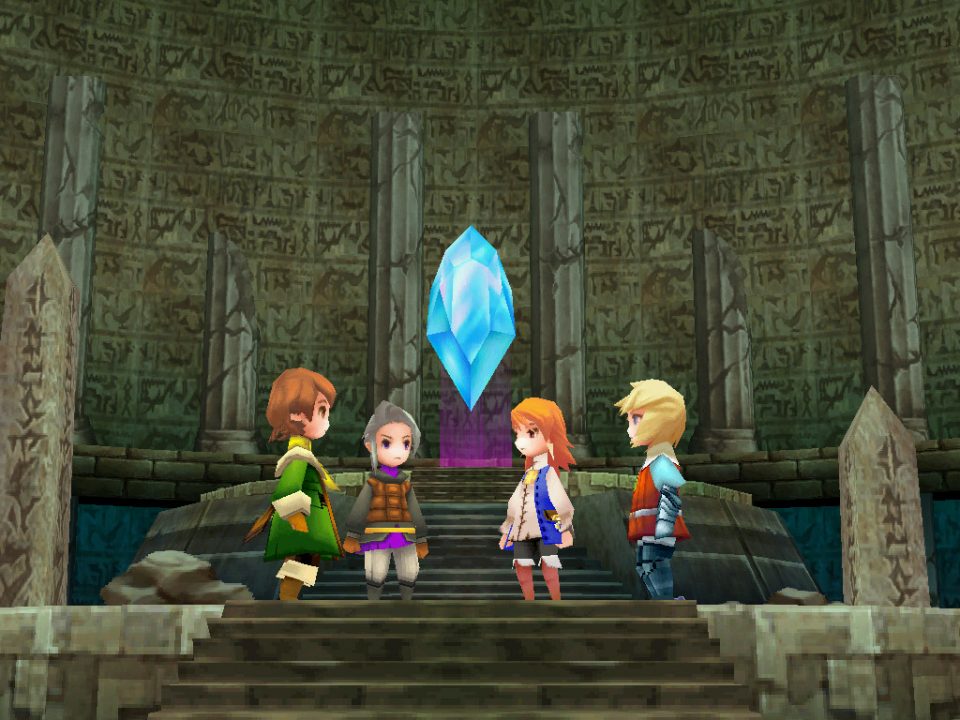
Quality-of-life features? In an NES RPG? No way. This is the NES we’re talking about. The place for 8-bit entertainment of the most exacting kind… Right?
Wrong.
Enter Final Fantasy III. This third installment in Square’s storied series includes some features that make its nonetheless demanding quest a tad more buttery smooth. Auto-targeting? Sweet. Little number popups that remind you who’s attacking whom as you select commands? Awesome. Throw in a story and a handful of systems that combine the best of FFI and FFII, and you’ve got the recipe for the absolute finest Final Fantasy on the NES.
Readers’ Choice
- Winner: Dragon Quest IV (41%)
- Runner-Up: Final Fantasy III (26%)
1991
Winner: Final Fantasy IV
by Jonathan Logan
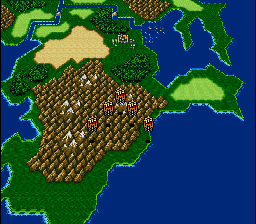
Final Fantasy I–III brought their own innovations to the series, including in-depth stories, unique characters, a complex job system, and massive worlds. But it wasn’t until the series moved to 16-bit that everything came together to make a cohesive whole.
Final Fantasy IV (FFII in the West) was a revelation for console-owning RPG fans. Unlike the previous entries, your characters have personalities and form deep relationships with each other. The Active Time Battle system represents a huge step forward for console RPGs, adding an element of real-time decision-making to the series’ turn-based combat. Add to that colorfully stunning 16-bit graphics, heartbreaking plot twists, and one of the most incredible scores ever written for a video game, and you have the best RPG of 1991.
Oh, and it also gave us the immortal line, “You Spoony Bard!” Just for that, it deserves its place in history.
Runner-Up: The Legend of Zelda: A Link to the Past
by Jonathan Logan
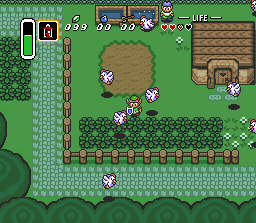
In 1991, there were only two Zelda games, and they were very different. It wasn’t until A Link to the Past that the overhead perspective and puzzle-solving gameplay became the standard for 2D Zelda games going forward.
From the moment you exit Link’s house into the pouring rain, ALttP exudes an incredible sense of scale. This new 16-bit Zelda offered a cast of unique characters, dozens of new weapons and items, two massive worlds, and more secrets than anyone could have imagined. While The Legend of Zelda and The Adventures of Link are both great games, it was ALttP that solidified the series as one of Nintendo’s flagships properties, and its popularity continues to this day.
Readers’ Choice
- Winner: Final Fantasy IV (49%)
- Runner-Up: The Legend of Zelda: A Link to the Past (26%)
1992
Winner: Final Fantasy V
by Jonathan Logan
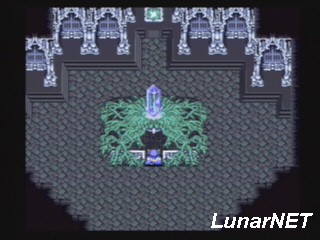
In full disclosure, while Final Fantasy V is the best RPG of ‘92, Western gamers didn’t get a chance to play it until ‘98 (unless you had an emulator). And that was a real shame because Final Fantasy V offered some of the deepest gameplay in the series yet.
The job system introduced in FFIII is vastly expanded, offering countless ways to customize your characters and play style. The graphics are wonderfully upgraded over FFIV, with much more expressive character sprites and beautiful locations. And by paring the main cast down to only four characters, the game is able to explore relationships in deep detail. If you missed this piece of RPG history back in the 90s/early 2000s, I can’t recommend it highly enough!
Runner-Up: Dragon Quest V
by Nilson Carroll
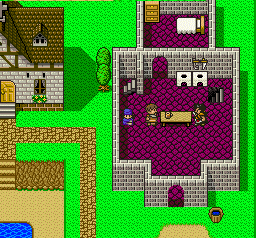
While most JRPGs opt to feature casts of teenagers and young adults, often bound together through extraordinary circumstances, Dragon Quest V does something much braver and closer to real life: players end up with a party of husband, wife, and children, an entire family unit (in addition to an army of monsters built through a proto-Pokémon monster catching system) that bands together in the face of evil itself. Out of all of the DQ identifying mechanics, this one feels the most inspired and poetic. Even though DQV is the first 16-bit DQ game, it’s hardly stylish or frenetic. But it represents the series’ strength and the core reason why fans love Dragon Quest—it provides a heartfelt adventure, a childhood forest daydream.
Readers’ Choice
- Winner: Lunar: The Silver Star (29%)
- Runner-Up: Dragon Quest V (28%)
1993
Winner: Secret of Mana
by Alana Hagues
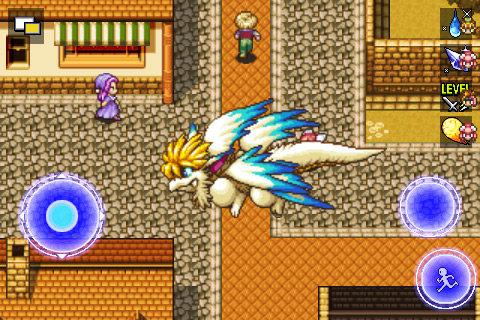
Secret of Mana isn’t the first action RPG to ever exist, but it’s arguably the one that put the genre on the map for the masses. As the second game in the Mana series, Secret of Mana took full advantage of the SNES to improve on everything its predecessor had done against the backdrop of a kaleidoscopic world bursting with colour and charm.
But the real draw is the three-player co-op. I remember getting an adaptor so I could play this game with my mum and older brother; being able to play my favourite genre with my family was amazing. I’ve replayed this game with friends over the years so I can delight in their reactions to the beautiful pixel art and watch them swap weapons to maximise experience.
Secret of Mana is a game that I’ve forged friendships and memories with, and while it has long since been exceeded, as my (and many others’) first SNES RPG, it deserves to be celebrated.
Runner-Up: Phantasy Star IV: The End of the Millenium
by Isaac Parsons
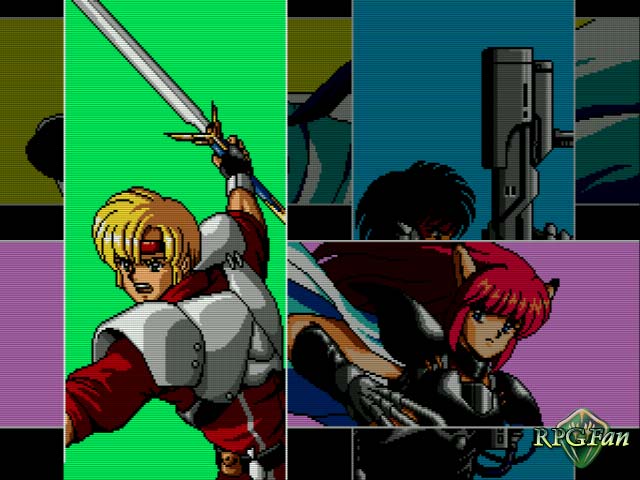
Within the first few minutes of Phantasy Star IV, players are bombarded by heavy subject matter presented in slick manga-style cutscenes with a hard-hitting soundtrack to match. There was no other game like it back in ’93, and nothing is quite its equal to this day. Beautiful over-the-shoulder battle sprites show off best-in-class combat animations, multiple planets to explore make the game feel like a massive journey, and smart additions to the battle system like macros and combination attacks keep it engaging the entire way through.
Readers’ Choice
- Winner: Secret of Mana (26%)
- Runner-Up: The Legend of Zelda: Link’s Awakening (22%)
1994
Winner: Final Fantasy VI
by Alana Hagues
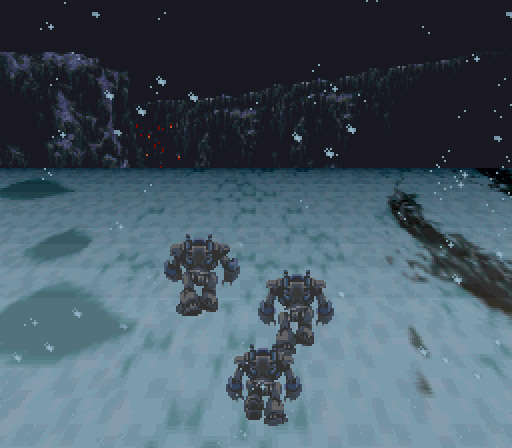
I was 20 years late to Final Fantasy VI (I know, I know), but even with its reputation preceding it, I was still in awe of what many consider to be one of Square’s greatest games.
To me, what makes FFVI truly special is the game’s refusal to conform to narrative structures from its predecessors (both FF and genre-wide). It does a remarkable job of giving most of the cast enough time to develop and shine. It’s thematically rich but doesn’t let any of those themes falter. Watching the rebels struggle against an empire and fail to save the world is heartbreaking, but watching them succeed is all the more incredible as a result. And the second half, where the game becomes non-linear, has driven many imaginations wild over the years. It’s also mechanically solid to boot, with customisation through Magicite and Espers!
Final Fantasy VI‘s ambition and heart is largely unmatched, even today, which is why it’s still such a seminal RPG.
Runner-Up: EarthBound
by Nilson Carroll
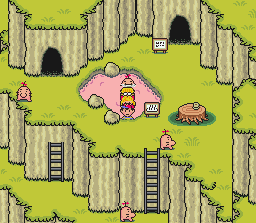
Originally known to US gamers as a game that came in a weirdly huge box and smelled like those gross scratch ‘n sniff cards in Nintendo Power, EarthBound would later find popularity as a ’90s avant-garde JRPG relic that inspired thousands of indie and art game devs to make their own trippy games. What makes it so special? Its evocative, nostalgic soundtrack? Its endless parade of perfectly crafted NPCs? On paper, it’s basically a Dragon Quest clone set in contemporary life with lots of jokes, and yet, it’s probably the most sublime, humane JRPG of all time. It’s got heart, it’s the real(est) deal.
Readers’ Choice
- Winner: Final Fantasy VI (65%)
- Runner-Up: EarthBound (18%)
1995
Winner: Chrono Trigger
by Jonathan Logan
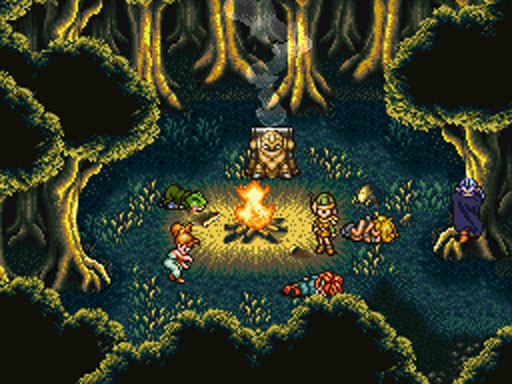
There is something about time travel that just clicks with me. Heck, I have a prop replica Flux Capacitor sitting on my desk! So it’s no shock that, when it came out in 1995, Chrono Trigger hit me like no other RPG ever did. In fact, I pretended to be sick the entire week so I could stay home from school and play it. (My mother later admitted that she knew I wasn’t, but pretended to be fooled. Now THAT’S good parenting!)
Chrono Trigger was the culmination of the Dream Team: Hironobu Sakaguchi, the creator of Final Fantasy, Yuji Horii, the creator of Dragon Quest, and character designer of Dragon Ball fame, Akira Toriyama. The game boosted stunning 16-bit graphics, endearing characters, and one of the greatest soundtracks of all time. The story, spread across six different eras, was epic, and was absolutely jam-packed with secrets and side quests. Let’s not forget that it has 16 different endings! Even now, after all these years, I still get that feeling of staying home from school every time I hear those ticks of the clock on the title screen.
Runner-Up: Suikoden
by Audra Bowling
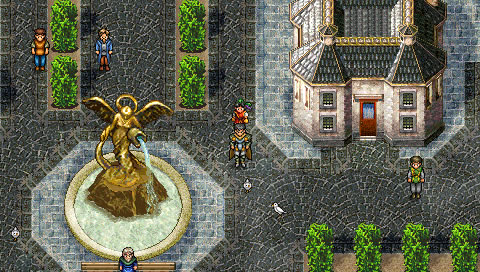
I first played Suikoden years after its initial release date, just before the release of Suikoden IV in the western markets, largely because of all the fandom excitement at the time over Ted being a character in both games. What I ultimately found was a noteworthy tale full of endearing characters and heartfelt situations, an RPG that carried and introduced many of the features I’ve come to know and appreciate about the series in an earlier form. As the cornerstone and starting point for a JRPG series that is especially near and dear to my heart, Suikoden provides an incredibly solid foundation. The first Suikoden makes for a strong beginning for the recruitable 108 Stars of Destiny, and it certainly provides the structure for the Suikoden titles that follow it.
Readers’ Choice
- Winner: Chrono Trigger (68%)
- Runner-Up: Suikoden (12%)
1996
Winner: Super Mario RPG: Legend of the Seven Stars
by Alana Hagues
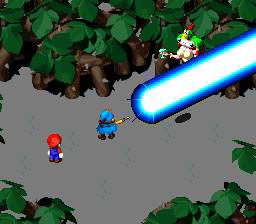
This is not only one of the best RPGs of all time, but also one of the best Mario games of all time. Super Mario RPG is an easy, breezy game that blends the best of Mario with the best of RPGs. There’s fun turn-based combat where you time button presses to get the most out of your attacks, which was hugely unique at the time. It also fully embraces the world and quirks of Nintendo’s favourite plumber too, where coins (money) and items are hidden in Question Blocks, and many normal enemies and characters from the platformers make an appearance, too.
Best of all, we have Super Mario RPG to thank for giving characters like Bowser and Peach distinctive and fun personalities that later games would adopt. But it also gave us many fun new characters, including Mallow and Geno, who both brought their own charm to a hilarious and fun game. If you want to introduce a kid to the world of RPGs and they love Mario, there’s no better classic than this.
Runner-Up: Wild ARMs
by Isaac Parsons
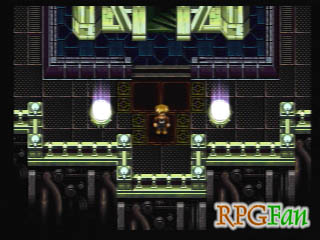
Few JRPGs take puzzles, dungeon design, and out-of-combat mechanics seriously. Wild ARMs on the other hand, while still incorporating an engaging battle system, truly revels in this space outside of combat. Utilizing the different tools each party member carries to make your way through dungeons keeps the player constantly engaged and gives Wild ARMs a very different pace from most RPGs. To stand out even further from the pack, Wild ARMs stars a silent gunslinger and is set in a world inspired by classic Westerns.
Readers’ Choice
- Winner: Pokémon Red and Blue (28%)
- Runner-Up: Super Mario RPG: Legend of the Seven Stars (26%)
1997
Winner: Final Fantasy VII
by Audra Bowling
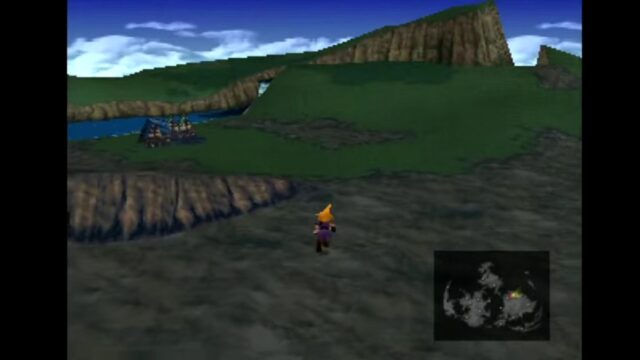
Final Fantasy VII was my first true RPG, and it got me hooked on the genre. I felt sheer awe when I put that first disc into my PlayStation to witness the opening sequence. I recall excitedly discussing the plot with my sister and how we tried convincing our humoring mother that the story was incredible, particularly once we reached Barret’s plotline.
I’ve replayed Final Fantasy VII more than any other game. My memory card had multiple save spots so that I could easily reach favorite scenes, the main cast in those saves proudly sporting the names of friends and family. To this day, I can even recite bits of script dialogue from it. I’d proudly show the ending credits to anyone willing to watch, and I recall desperately wanting that Aeris resurrection rumor to be true. I lost myself in wandering through the world map, playing addictive minigames, and experimenting with Materia combinations.
With Final Fantasy VII, Square created a phenomenal JRPG experience. Its influence is still seen today in the popular Compilation of FFVII and cemented with the success of the first part of the remake, but I’ll always have a special place in my heart for the original.
Runner-Up: Final Fantasy Tactics
by Michael Sollosi
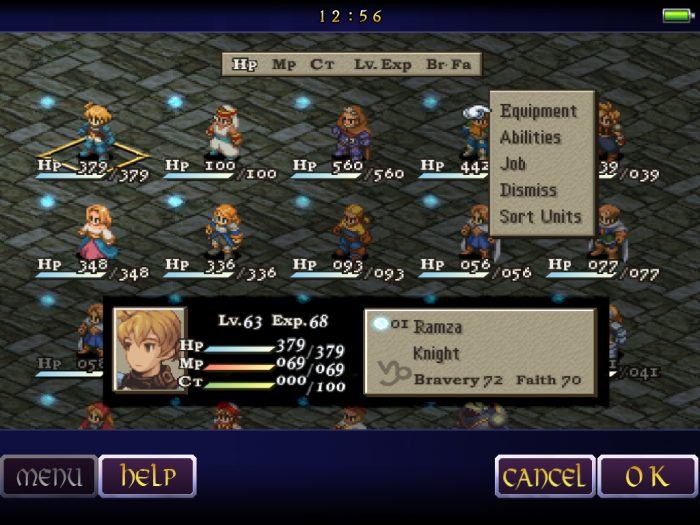
Final Fantasy Tactics unites the politics-heavy storytelling, intricate combat, and Hitoshi Sakimoto music of the former Quest team with Final Fantasy character classes, monsters, and iconography to create one of the most influential and popular strategy RPGs of all time. FF Tactics is the story of a war with a known outcome but forgotten details, with the friendship and trials of fallen noble Ramza Beoulve and commoner turned king Delita Heiral taking center stage to brilliant effect. Final Fantasy Tactics is an all-time-great RPG narrative, but more importantly you can create devastating puncher-Ninjas and katana-ghost Black Mages, and level battlefields with the power of math magic.
Readers’ Choice
- Winner: Final Fantasy VII (49%)
- Runner-Up: Final Fantasy Tactics (20%)
1998
Winner: Xenogears
by Isaac Parsons
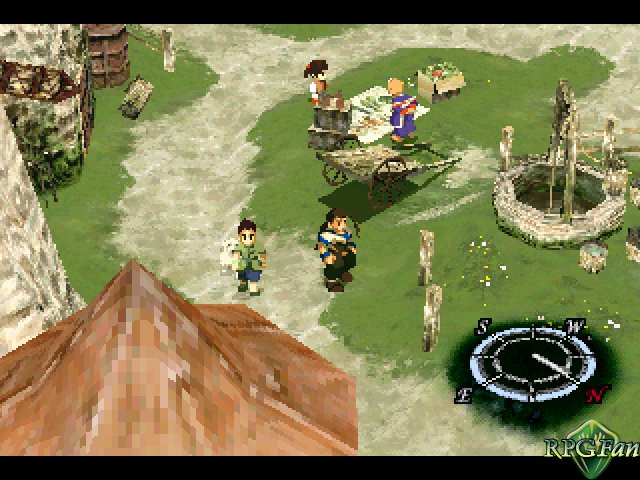
Stand tall and shake the heavens: these powerful words aren’t just the tagline for SquareSoft’s PS1 classic, Xenogears, but also get to the very essence of it. Xenogears was the first time we learned of director Tetsuya Takahashi’s predisposition for weaving together ideas taken from philosophy, psychology and religion into something incredibly ambitious. Xenogears is in turns tragic, uplifting, and beautiful. These feelings are exemplified in a superb Yasunori Mitsuda soundtrack and gorgeously animated anime cutscenes. Xenogears is not just a multi-generational epic, but a story of personal growth that holds one of the most well-realized romantic relationships in a video game.
Xenogears is no slouch in the gameplay department either. Turn based martial arts inspired combat allows the player to string together smooth combos with powerful finishing moves. Characters each have a personal mecha used for titanic clashes against powerful foes between classic on-foot battles. Outside of combat Xenogears allows the player a freedom uncommon in RPGs: vertical exploration, including a jump button. Playing Xenogears for the first time left me thinking it was nothing short of a masterpiece. Since then I have had the repeated opportunity to witness Xenogears awe others in a similar way.
Runner-Up: Suikoden II
by Zach Wilkerson
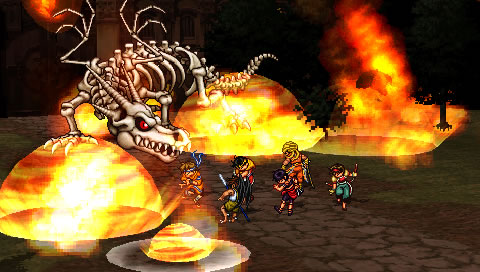
It would be difficult to overstate my love for Suikoden II. It is the only game that, upon completion, I felt compelled to play again. Suikoden II has everything going for it (except for the dodgy translation). I’m actually pretty sad I’m writing about this as the runner-up! Its battle system is snappy and fun. The soundtrack perfectly suits every moment. The story is complex and treats all its characters with respect and empathy. Suikoden II features the most maniacal, evil villain in all of JRPGs, and that’s not even the best part. The best part, of course, is the relationship between Riou, Jowy, and Nanami. They bring incredible heart to this stellar RPG, and it truly stands the test of time.
Readers’ Choice
- Winner: Suikoden II (25%)
- Runner-Up: Xenogears (24%)
1999
Winner: Chrono Cross
by Eva Padilla
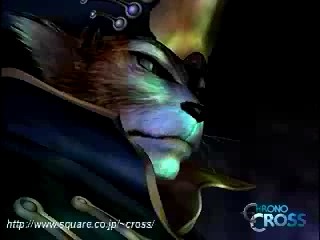
Now fully two decades on, what can be said of Chrono Cross, a creation birthed from the haunted, sleepless nights of writer Masato Kato and a constricted development team? There’s a color-based combat system that is both fascinating and an evolutionary dead-end. A dissonant racket (45 playable!) of character designs can turn these tropical vistas garish. The story contains some of the worst excesses of Square’s PlayStation output.
Despite all this, Chrono Cross conjures up a wonder all its own, standing in open rebellion to its more-beloved older sibling. Where Chrono Trigger is a near-perfect monolith, Chrono Cross is profoundly human. At its core lies a writhing, infantile heart that yearns to be free of all shackles. For Mitsuda’s breathtaking soundtrack, for the devastating fight with Miguel, and for every tear I’ve shed for Kid, I choose to love Chrono Cross for everything it is and will never be.
Runner-Up: Final Fantasy VIII
by Audra Bowling
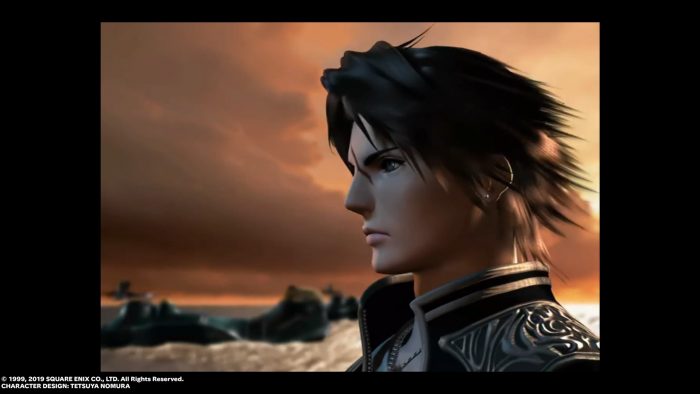
Playing Final Fantasy VIII after having extremely fond memories of its predecessor made for an interesting gaming experience for me. I can’t say Final Fantasy VIII is flawless. Even as young as I was when I first gave it a try, I could see the myriad imperfections in its storyline. Yet I was still taken in by the game’s world: relishing in delight along with Selphie at every opportunity, becoming invested in the developing romance between Squall and Rinoa, figuring out how to best tackle the magic system, and even spending more hours than I probably should have on Triple Triad. Final Fantasy VIII might not have been perfect, but as my second foray into Final Fantasy, I still remember it fondly. After all, who can forget that opening?
Readers’ Choice
- Winner: Chrono Cross (23%)
- Runner-Up: Pokémon Gold & Silver (19%)
That’s all for this section of the list! Come back soon to read the remainder, all the way up to 2019. Stay tuned!

